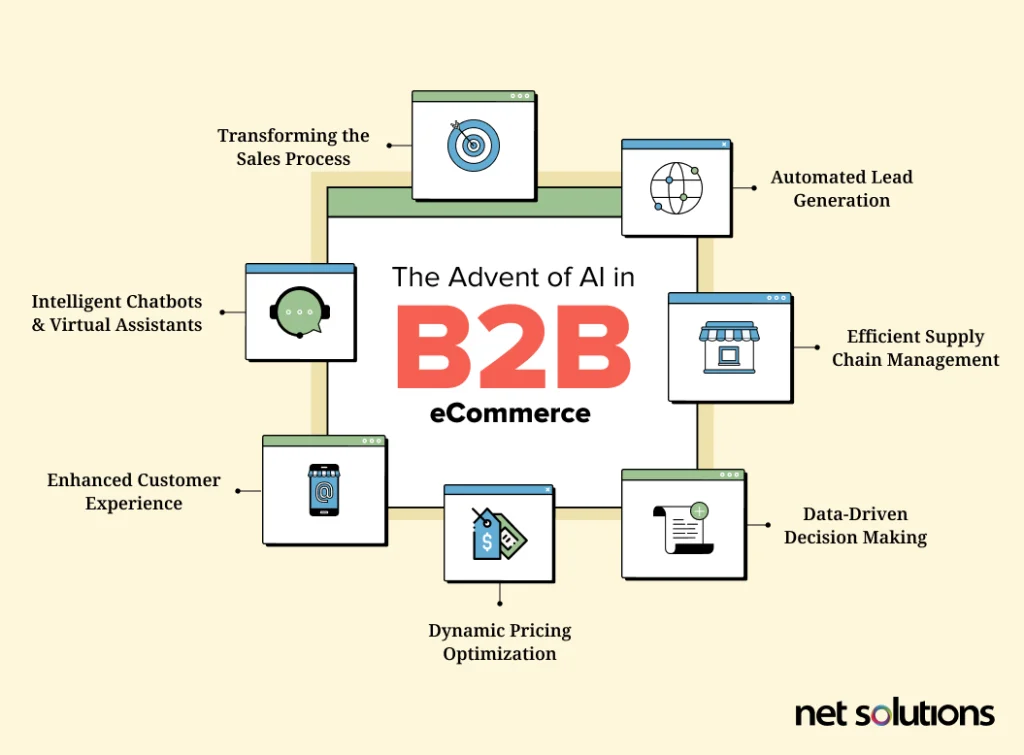Why AI Automation For B2B is key to agile business processes
The Future of B2B: Taking Advantage Of AI Automation to Drive Success
The landscape of B2B is changing as business progressively turn to AI automation for tactical benefit. This improvement guarantees to enhance performance and consumer interaction through innovative innovations. Nevertheless, the integration of these devices is not without its challenges. Comprehending exactly how organizations can navigate this evolving surface will be vital for future success. What factors will identify the efficiency of AI in this industry? The solutions might redefine traditional organization versions.
Recognizing AI Automation in B2B
As organizations increasingly look for efficiency, comprehending AI automation in B2B comes to be vital. AI automation describes the use of man-made intelligence innovations to simplify and enhance business processes. In the B2B market, this entails the combination of AI devices to manage tasks such as data evaluation, consumer communications, and supply chain operations. By leveraging device understanding and natural language processing, business can boost precision, reduce human error, and speed up decision-making (AI Automation For B2B). Furthermore, AI automation assists in the handling of huge quantities of information, enabling companies to remove valuable understandings and enhance their procedures. As companies browse this technical landscape, an extensive grip of AI automation's capabilities will empower them to stay competitive and receptive to market needs
Key Benefits of AI Automation for Companies
While numerous services face raising functional needs, AI automation presents countless advantages that can considerably improve their performance. One considerable advantage is efficiency; AI systems can carry out repeated tasks faster and with greater accuracy than humans, thereby reducing errors and releasing up staff members for even more critical initiatives. In addition, AI automation allows data-driven decision-making by examining huge datasets rapidly, offering insights that inform organization approaches. Expense reduction is another key advantage, as automation lessens labor expenses and maximizes resource allotment. AI can improve scalability, enabling companies to adjust to market modifications swiftly. Inevitably, the combination of AI automation fosters technology, allowing companies to continue to be affordable in a rapidly advancing landscape.
Transforming Client Experiences With AI
AI is reshaping consumer experiences by allowing personalized interactions and boosting engagement. Through the execution of anticipating analytics, services can expect client requirements and choices, leading to more tailored solutions. Furthermore, enhancing support procedures with AI innovation improves efficiency and contentment, eventually transforming the overall client trip.
Customized Communications and Involvement
Individualized communications have actually ended up being a keystone of efficient customer involvement in the B2B landscape. By leveraging AI-driven options, services can tailor their communication and offerings to fulfill the special needs of each client. Automated systems examine customer actions, data, and choices, allowing companies to develop tailored experiences that resonate with their target market. This level of personalization not only boosts client satisfaction yet additionally promotes long-term loyalty. In addition, AI devices help with real-time interactions, enabling services to react without delay and successfully to inquiries and feedback. As an outcome, business can build stronger relationships with customers, making certain that their solutions straighten with evolving expectations. Ultimately, individualized involvement with AI leads to boosted results and sustained success in the competitive B2B market.
Anticipating Analytics Execution
As businesses increasingly seek to boost client experiences, implementing anticipating analytics has become an essential strategy in the B2B field. By leveraging data-driven insights, companies can anticipate consumer needs and choices, enabling them to customize their offerings much more properly. Predictive analytics makes use of historical data and innovative algorithms to forecast future actions, allowing organizations to identify potential obstacles and opportunities. This positive approach not only boosts customer contentment but likewise cultivates commitment by delivering pertinent and timely options. In addition, predictive analytics helps in source allocation, guaranteeing that advertising and marketing initiatives are focused on high-value potential customers. Ultimately, the integration of anticipating analytics equips B2B business with the devices necessary to transform client communications and drive lasting success in a progressively competitive landscape.
Enhancing Support Processes
Enhancing customer experiences in the B2B market extends past anticipating analytics; simplifying assistance processes plays a necessary duty. By incorporating AI-driven remedies, businesses can automate routine questions and enhance reaction times, bring about enhanced consumer satisfaction. Chatbots and virtual assistants offer 24/7 support, dealing with client needs promptly and reducing the burden on human representatives. This automation permits groups to focus on complex concerns, cultivating even more significant interactions. AI tools can analyze assistance data to identify fads and locations for improvement, ensuring continual enhancement of service top quality. As organizations adopt these modern technologies, they position themselves as customer-centric and receptive, eventually driving loyalty and organization growth in an increasingly affordable landscape.
Enhancing Operations and Processes
Streamlining procedures and processes in B2B atmospheres is important for enhancing general effectiveness. By enhancing process efficiency and automating regular tasks, companies can decrease hand-operated errors and liberate useful resources. This shift not just enhances productivity however also allows groups to concentrate on critical initiatives that drive development.
Optimizing Process Performance
Optimizing process efficiency is necessary for businesses seeking to lower operational expenses and boost productivity. By examining existing procedures, companies can identify bottlenecks and redundancies that prevent efficiency. Implementing streamlined treatments improves interaction and collaboration among groups, making certain that tasks are completed much more quickly. Making use of data-driven understandings enables firms to make educated choices that fine-tune procedures better. Additionally, adopting integrated innovations can assist in smooth information flow, decreasing the risk of delays and errors. As services accept these modifications, they not only promote a much more active workplace however likewise position themselves to respond rapidly to market demands - AI Automation For B2B. Ultimately, concentrating on workflow efficiency allows companies to allot sources properly, driving lasting success in a significantly affordable landscape
Automating Routine Jobs
Several companies are progressively transforming to automation to take care of regular tasks, recognizing its potential to substantially boost operational efficiency. By deploying AI-driven remedies, firms can enhance repetitive tasks such as information entry, billing handling, and client inquiries. This shift not only lowers human error but additionally liberates important staff member time, enabling staff to concentrate on value-added tasks and critical efforts. Additionally, automation can boost reaction times and solution consistency, leading to improved customer complete satisfaction. As businesses browse a competitive landscape, leveraging automation for regular tasks comes to be vital for preserving and optimizing workflows dexterity. Ultimately, this technique fosters advancement and drives development, positioning companies for long-term success in the progressing B2B environment.
Enhancing Decision-Making With Information Insights

Overcoming Challenges in AI Execution
Although AI execution holds the assurance of significant functional improvements, organizations often deal with a myriad of difficulties that can prevent progress. Secret challenges consist of information high quality concerns, as many enterprises struggle with incomplete or inconsistent datasets necessary for effective AI training. Additionally, resistance to change within the workforce can hinder the adoption of AI innovations, as employees might be afraid work displacement or lack the necessary abilities. Spending plan constraints additionally present a difficulty, limiting investment in the called for facilities and talent. Moreover, incorporating AI systems with existing procedures can be complex, requiring substantial time and sources. Overcoming these challenges demands a calculated technique that includes extensive training, modification administration, and a dedication to continual enhancement in AI initiatives.
Future Fads: The Following Frontier in B2B Automation
While the landscape of B2B automation remains to evolve, arising patterns are poised to redefine just how organizations run. The integration of innovative expert system will certainly assist in much more tailored client experiences, allowing organizations to tailor remedies exactly to client requirements. In addition, the increase of anticipating analytics will make it possible for companies to prepare for market shifts and maximize decision-making processes. Automation of regular tasks through robotic process automation (RPA) will certainly improve effectiveness, lowering operational expenses substantially. Additionally, the fostering of blockchain technology guarantees boosted openness and safety in deals. As these developments gain traction, firms will progressively leverage AI-driven understandings to promote collaboration, simplify supply chains, and improve total efficiency, noting a transformative change in the B2B landscape.
Regularly Asked Questions
What Sorts Of Organizations Can Profit Most From AI Automation?
Manufacturing, logistics, and client service organizations can benefit most from AI automation. These industries improve functional performance, reduce costs, and improve client interactions, eventually bring about raised performance and profitability in an open market.
How Can Local Business Apply AI Automation Efficiently?
Local business can implement AI automation successfully by recognizing recurring jobs, selecting straightforward devices, guaranteeing appropriate training for workers, and slowly integrating services to optimize workflows while monitoring performance and readjusting approaches based upon comments.
What Are Typical False Impressions Concerning AI in B2B?
Typical mistaken beliefs regarding AI in B2B include the idea that it is just for large enterprises, that it assures immediate results, and that it can totally replace human decision-making as opposed to augmenting it. Growth Systems For B2B.
Just How Does AI Automation Effect Employee Responsibilities and Task Security?
AI automation improves worker roles by simplifying repeated tasks, cultivating efficiency and innovation. While some anxiety task loss, it frequently develops chances for upskilling and new settings, ultimately boosting job protection with included value and performance.
What Abilities Are Needed to Take Care Of AI Automation Projects?

As companies significantly seek effectiveness, recognizing AI automation in B2B ends up being crucial. AI automation helps Minarik AI with the handling of huge volumes of data, making it possible for companies to remove valuable insights and enhance their procedures. While many services grapple with raising operational demands, AI automation offers numerous benefits that can noticeably enhance their performance. Automation of routine jobs via robot process automation (RPA) will enhance effectiveness, lowering operational costs significantly. Production, logistics, and consumer solution businesses can benefit most from AI automation.